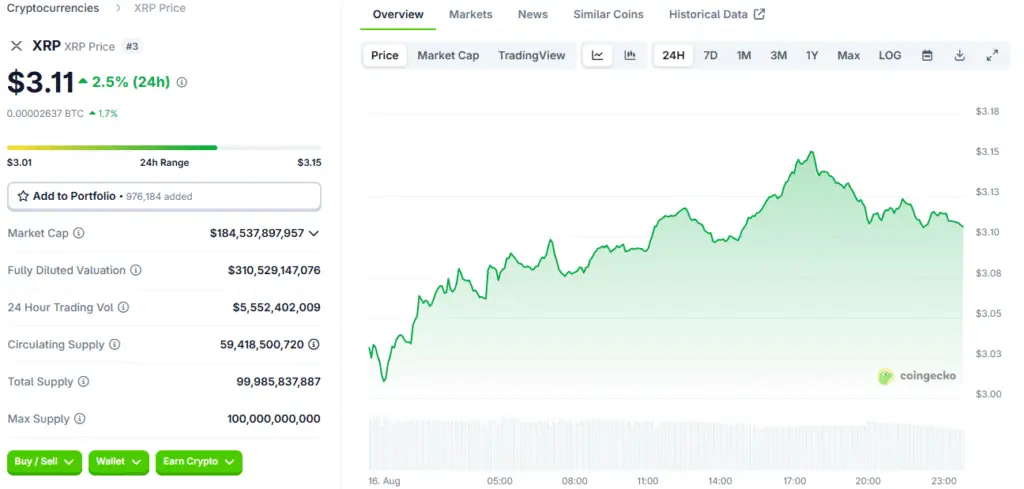XRP ETFs: A New Source of Stability and Liquidity
The cryptocurrency market is abuzz with the potential of XRP ETFs, or exchange-traded funds that would allow investors to gain exposure to XRP without having to directly hold the token. These new financial products could bring a new level of stability and liquidity to the market. With the SEC now reviewing XRP ETF applications, especially after the settlement of its lawsuit against Ripple, the path to a more regulated and mature market is becoming clearer.
This regulatory clarity is crucial for the long-term growth of the crypto market, as it can attract a new class of institutional investors who have been hesitant to enter the space due to legal uncertainty. The potential for a new source of capital and liquidity is a major factor that could reshape the market dynamics for XRP and other cryptocurrencies.

The Ripple Effect of XRP ETFs on Fintech
The approval of XRP ETFs could have a particularly significant impact on fintech startups in Asia. For these companies, which often rely on XRP for cross-border payments and payroll, regulatory clarity is a game-changer. It means that integrating XRP into their payroll systems becomes easier and more secure, as they can operate with a higher degree of certainty about legal compliance.
The increased demand from both retail and institutional investors that would follow an ETF approval is also good news. A surge in investor interest would lead to better liquidity and market depth, which is crucial for fintechs that need an efficient and reliable payment solution to stay competitive. The XRP ETF effect, therefore, could provide a strong tailwind for these startups, helping them to scale their operations and expand their reach.
Benefits of Using XRP for Payroll
The benefits of incorporating XRP into payroll systems are significant. The most obvious perk is improved liquidity. As XRP ETFs expand the market, startups will have access to a more liquid asset to pay their employees. This is essential for ensuring fast and reliable payments, which is a key factor in employee satisfaction and operational efficiency. The technology behind XRP is also a major advantage.
Its blockchain allows for almost instant and low-cost cross-border transactions, a feature that is perfect for fintechs with global teams. They can speed up their payroll process and cut down on expensive foreign exchange fees, which is a major cost-saver. The combination of improved liquidity and efficient technology makes XRP a compelling option for businesses looking to modernise their financial operations.
Addressing Volatility and Compliance with XRP
Despite the benefits, fintech startups face a number of hurdles when integrating XRP. Regulatory compliance remains a big one, as the scene is constantly shifting and can create confusion about what is required to use XRP for payroll. Market volatility is another concern, as XRP’s price can swing wildly, creating financial uncertainty for businesses that rely on it.
To combat this, many companies are looking at using stablecoins to keep salaries steady while still getting the speed of XRP. By combining the two, they can provide fast and reliable payroll solutions without the risk of price fluctuations. This hybrid approach allows startups to leverage the benefits of crypto while mitigating its risks, a strategy that is crucial for building a sustainable business model.
The Synergy of XRP and Stablecoin Salaries
XRP ETFs could also push the adoption of stablecoin salaries into the spotlight. As institutional interest in XRP rises, its liquidity and stability are expected to improve, which in turn makes it a more appealing option for payroll. Stablecoins, which are pegged to fiat currencies, solve the issue of crypto volatility.
By combining the speed and low cost of XRP with the stability of stablecoins, fintech startups can offer fast and reliable payroll solutions, especially for small and medium-sized enterprises (SMEs) that might be wary of crypto price fluctuations. This combination provides a powerful new model for payroll that offers the best of both worlds: the efficiency of crypto and the stability of traditional money.
Risks and Rewards for SMEs
For SMEs, the introduction of XRP ETFs presents a mixed bag of risks and rewards. On the upside, there’s a chance for better liquidity, making international trade and crypto payments easier. With institutional backing, they also gain a new level of credibility and trust. On the downside, there’s still a lot of uncertainty with regulations, which can create a legal and financial risk.
Market volatility is another concern, as is the challenge of integrating a new crypto system into existing financial operations. In short, XRP ETFs could open up some exciting opportunities for SMEs, but they’ll have to proceed with caution and keep a close eye on regulations and market volatility.
Coinbase’s Strategic Shift Reallocates XRP Holdings
Coinbase’s reduction in XRP holdings is a complex one. It’s not about pulling out of the market entirely, but rather a strategic shift in how liquidity is provided. This reallocation could actually benefit fintech startups in Asia, supporting their cross-border payment and payroll solutions with improved liquidity access. As the crypto landscape continues to be shaped by new regulations, businesses will need to adapt their strategies to leverage the benefits of crypto payroll solutions.
The future of crypto payments is bright, with the potential for greater efficiency, transparency, and cost-effectiveness in managing payroll and financial operations. This move by Coinbase is a key indicator of a maturing market, where a strategic and compliant approach to asset management is becoming the new standard.
Read More: Wellgistics Health Transforms Pharma Payments with XRP















